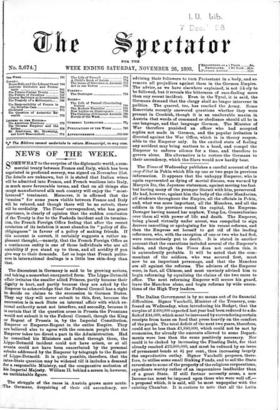The Times of Wednesday publishes a careful account of the
coup d'etat in Pekin which fills up one or two gaps in previous information. It appears that the unhappy Emperor, who is again represented as dying of mortal disease, was warned by Marquis Ito, the Japanese statesman, against moving too fast but having many of the younger literati with him, persevered He had, however, against him the body of the elder Mandarins, all students throughout the Empire, all the officials in Pekin, and, what was more important, all the Manchus, and all the soldiers in the province round the capital, the Empress- Dowager having named her nephew, Yung-Ln, Generalissimo over them all with power of life and death. The Emperor, being placed virtually under arrest, was compelled to sign decrees cancelling or apologising for his recent reforms, and then the Empress set herself to get rid of the leading reformers, who, with the exception of one or two who had fled, were remorselessly put to death. It is stated in another account that the executions included several of the Emperor's ladies, and though the Times does not confirm this, it is antecedently probable. It will be noted that the com- mandant of the soldiers, who was secured first, must now be an important personage, and that the Manchus are all against the reforms. The advisers of the Emperor were, in fact, all Chinese, and most unwisely advised him to begin reforming by equalising the claims of the two races to office. The next reforming Emperor will secure his guard, leave the Manchus alone, and begin reforms by wide execu- tions of the High Tory leaders.










































